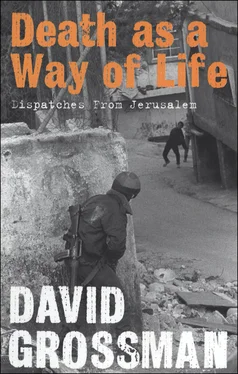David Grossman - Death as a Way of Life
Здесь есть возможность читать онлайн «David Grossman - Death as a Way of Life» весь текст электронной книги совершенно бесплатно (целиком полную версию без сокращений). В некоторых случаях можно слушать аудио, скачать через торрент в формате fb2 и присутствует краткое содержание. Год выпуска: 2013, Издательство: Bloomsbury Publishing, Жанр: Прочая документальная литература, на английском языке. Описание произведения, (предисловие) а так же отзывы посетителей доступны на портале библиотеки ЛибКат.
- Название:Death as a Way of Life
- Автор:
- Издательство:Bloomsbury Publishing
- Жанр:
- Год:2013
- ISBN:нет данных
- Рейтинг книги:5 / 5. Голосов: 1
-
Избранное:Добавить в избранное
- Отзывы:
-
Ваша оценка:
- 100
- 1
- 2
- 3
- 4
- 5
Death as a Way of Life: краткое содержание, описание и аннотация
Предлагаем к чтению аннотацию, описание, краткое содержание или предисловие (зависит от того, что написал сам автор книги «Death as a Way of Life»). Если вы не нашли необходимую информацию о книге — напишите в комментариях, мы постараемся отыскать её.
Death as a Way of Life — читать онлайн бесплатно полную книгу (весь текст) целиком
Ниже представлен текст книги, разбитый по страницам. Система сохранения места последней прочитанной страницы, позволяет с удобством читать онлайн бесплатно книгу «Death as a Way of Life», без необходимости каждый раз заново искать на чём Вы остановились. Поставьте закладку, и сможете в любой момент перейти на страницу, на которой закончили чтение.
Интервал:
Закладка:
The Palestinians who signed the open letter to the Israeli public, and the many other Palestinians and Israelis who believe in what I have written here, can still hold discussions among themselves. Of course they are not authorized to conduct negotiations, but at least they have the power to renew the dialogue. Perhaps we will be able to find creative and just solutions at the points where the politicians — for a variety of reasons — are not able to rise above their short-term needs.
As an Israeli who seeks peace, I ask: Can we meet — yes, even in these times — on the border, both the metaphorical and the concrete demarcation, somewhere between Palestine and Israel, say, in a peace tent that we erect there together? Can we present an alternative of any sort to the rampant animosity, hatred, killing, and revenge? Can we halt the mad, violent whirlwind that threatens to sweep up all of us?
Here, this is an invitation to dialogue.
Point of No Return
January 2001
A major point of contention between Palestinians and Israelis continues to be the “right of return” of the Palestinian refugees. About 800,000 people who fled or were expelled from Palestine during the 1948 War of Independence between the newly established state of Israel and four Arab countries were kept by the Arab states in refugee camps in Lebanon, Jordan, the Jordanian West Bank, and the Egyptian-ruled Gaza Strip. After the Six-Day War, when Israel conquered the West Bank and Gaza, the refugees in those territories came under Israeli control. The ongoing dispute over Israel’s responsibility for the creation of the refugee problem has not been resolved, and no solution has been found. The number of Palestinian refugees today is estimated at 5.5 million people around the world.
The “right of return” has been a central Palestinian demand for the last fifty-two years. Yet only in recent weeks has it penetrated Israeli consciousness as a concrete and threatening possibility. It now looks as if the Palestinian insistence on the “right of return” will lead even the most steadfast of Israeli doves — myself included — to the reluctant and disheartening conclusion that peace cannot be achieved at this time.
Many Israelis live with an inner conflict between their moral and natural desire to repair a decades-old injustice and their profound apprehensions about the “right of return.” The prospect of the return of the Palestinian refugees, who fled or were expelled from Israel during and after the War of Independence, confronts every Jewish Israeli with the most problematic roots of Israel’s definition of itself as the Jewish state. The Jewish majority’s explicit desire to retain its numerical superiority is one that, when it comes down to it, beats in the heart of every nation. Every nation wishes to preserve its values and heritage and pass them on to the generations to come; such an aspiration is neither jingoistic nor racist. In the case of the Jewish people, with their tragic history, it is even more comprehensible, although it remains an unresolved discrepancy in the democracy they desire.
In my view, accepting the Palestinian demand would be a dangerous move for Israel as a Jewish state, and as a political entity. Israel must accept its partial responsibility for the refugee problem, alongside the Arab countries that created the problem in 1948. Israel must help raise the funds to resettle the refugees, and must allow some refugees to return for purely humanitarian reasons. Likewise, Israel must recognize the refugees’ bonds to the places they were torn away from. But there is a great distance between an affinity to a place and the “right to return” there.
The Palestinians have been trying to reassure Israelis by explaining that even if the agreement refers to the “right of return,” it will be only a formal right. In practice, they say, “only” a few hundred thousand refugees will resettle inside Israel (where there are today 5 million Jews and a million Palestinians). I don’t understand this distinction. A right is a right, and if a right is granted, it exists, in full. Anyone with a sense of responsibility for the generations to come must today consider how, fifty years from now, his great-grandchildren will explain to the great-grandchildren of today’s refugees that the “right of return” that Israel recognized was only a theoretical one, a formality.
For decades the Israeli peace camp, together with the Palestinian peace camp, has worked to disseminate the concept of “two states for two peoples.” In other words, a Palestinian national state that will live in security and peace alongside the state of Israel, the Jewish national state. Yet the demand for a sweeping “right of return” will lead, in practice, to a situation in which the Palestinians have a national state, Palestine, while Israel becomes, instead of a Jewish state, a Jewish and Palestinian state — in other words, a political entity whose identity will gradually become blurred.
Jewish villages and cities have been built during the last fifty years on the ruins of the villages in which the Palestinian refugees once lived. This is a heartrending fact for the refugees, but changing it would require tearing millions of Jews away from their homes, and to where? Let us not forget that the great majority of these Jews are themselves members of refugee families who fled ancestral homes in Europe and the Islamic world. Will committing yet another injustice bring the two peoples closer to peace?
“What do you mean?” my Palestinian friends ask me when we blow up at each other during arguments, time after time, over this issue. “If Israel accepts the principle of the ‘right of return,’” they argue, “and the refugees indeed return, an entirely new reality will be created here, a reality of conciliation and mutual forgiveness, a reality of true peace.”
If that could only be true. I desperately want to believe it can. It certainly fits my natural inclinations to dream, as they do, of a peace that will come to be despite the violence around and among us. I long for a world in which all the hate, hurt, and suspicion of the past are nobly set aside. But as one who lives here in this deeply divided, extremist, fundamentalist region, I know that a good solution is one that tries — at least in its early stages — to do everything possible to avoid friction between rival populations. It must be a solution that does not impose too difficult a test on our faith in the goodwill of either Jews or Muslims and their ability to rise above their instincts and fears.
Many conflicts of the twentieth century were eventually resolved with compromises that did not include mass repatriation of refugees. Such was the case, for example, with the Sudeten Germans, and in the German-Polish conflict over the German refugees from the German territories, which were annexed to Poland in 1945. These former enemies understood that the return of millions of refugees was actually liable to destabilize the new reality. They preferred to dampen the pain of the past for the sake of an opportunity for the future.
If we accept the “right of return” principle, hundreds of thousands — perhaps millions — of Palestinians will move into a country which they have for years sworn to destroy. Before long they will become the largest population group here. Yet their principal aspiration has been to fight Israel and its symbols, and it is this heritage that they have passed on to their children. Is there a country in the world that can agree, of its own free will, to take in such a population? Can Israel, whose civil society is fragile already, do so without falling apart?
Furthermore, even if the Jews continue to remain a majority in Israel for another ten or twenty years, they will not be a majority for long. When they do become a minority, my fear is that they will be tempted — just like any nation that senses that its hold on its own country is slipping out of its hands — to establish a dark apartheid regime based on military might or on prejudicial and draconian legislation. This would inevitably lead to an explosion and the collapse of the country’s political framework.
Читать дальшеИнтервал:
Закладка:
Похожие книги на «Death as a Way of Life»
Представляем Вашему вниманию похожие книги на «Death as a Way of Life» списком для выбора. Мы отобрали схожую по названию и смыслу литературу в надежде предоставить читателям больше вариантов отыскать новые, интересные, ещё непрочитанные произведения.
Обсуждение, отзывы о книге «Death as a Way of Life» и просто собственные мнения читателей. Оставьте ваши комментарии, напишите, что Вы думаете о произведении, его смысле или главных героях. Укажите что конкретно понравилось, а что нет, и почему Вы так считаете.












